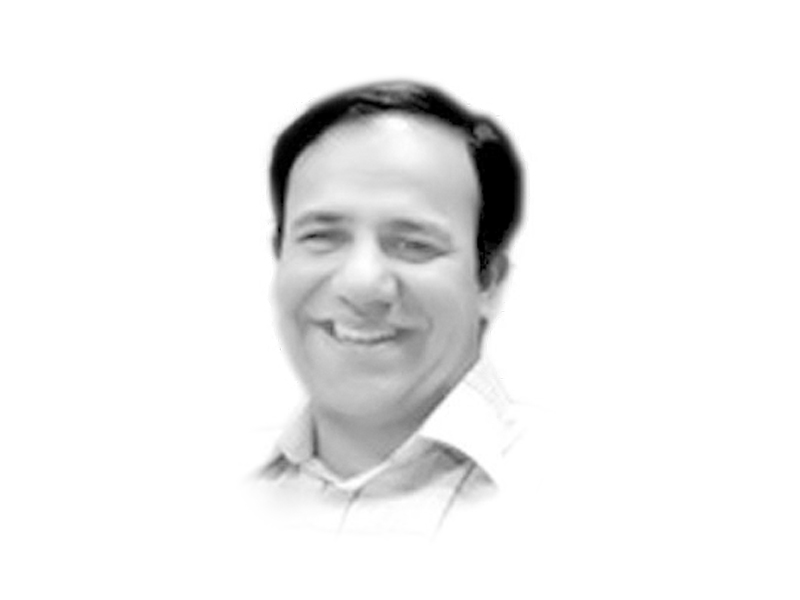
I came back from that meeting thinking that the biggest challenge for the government, ironically, is to effectively monitor its own work. Did the school teachers show up in class today? Did the drug inspectors actually visit the drug stores before filing their compliance reports? Did the district government staff use the anti-mosquito spray in the neighbourhood’s most vulnerable to a dengue outbreak? Did the sanitary workers fix the sewerage problem before monsoon?
Over the last two years, we, at the Punjab Information Technology Board (PITB), focused our energies on solving this problem. Our instrument of choice: smartphone. Historically, governments have invested billions in buying personal computers, laptops, data centres and fibre connectivity to power enterprise applications, but adoption has been a perennial challenge. The smartphone naturally solves many challenges at once: it is cheap (less than $100) and portable, intuitive to use, doesn’t require uninterrupted power, includes an embedded GPS device and has an always-on network connection. Most importantly, it has some social value embedded in it: people can use it to call family and friends, their children can play games on it. Unlike a PC, it is typically not handed over to some assistant in a back-office.
Our first application, developed literally over a weekend, was for the City District Government Lahore to track the activities of its dengue prevention field staff. Each worker was given a basic Android phone and our first application enabled the field workers to take a picture of a completed task, tag its GPS coordinates (geo-tag) and upload it to our dashboard. Our system time-stamped the incoming pictures and mapped them to the field worker’s phone numbers. Visualised on a Google map, we instantly started getting a feel of where and when the prevention activities were performed, or not.
As our anti-dengue campaign progressed, we bought 1,500 Android phones and kept refining our applications. The system was used by 17 different government departments and hundreds of field workers, and we have received over 200,000 pictures from all over Punjab. We developed more applications that enabled field entomologists to report Aedes Larvae clusters, as well as health workers to GPS tag the houses of the confirmed patients. With this data flowing in, we built a state-of-the-art epidemic early warning system, which statistically analysed the larvae reports and patient locations, and raised red flags wherever it detected a potential outbreak. This information was promptly shared with the local government to help it target its activities in the most vulnerable areas.
This system has led to a full-blown real-time disease surveillance system in Punjab, tracking all 26 WHO notifiable infectious diseases. Cross-verification of data from our dashboard has become a common practice in the government. The system has been featured by the MIT Technology Review, The Economist, NPR and BBC.
Encouraged by the success of our system for tracking disease outbreaks, the PITB has been working on numerous applications to help the government monitor its own work. Drug inspectors now carry our smartphones to report their visits to pharmacy outlets; visits of livestock EDOs are tracked using our smartphone applications; Lahore police uses our smartphone applications to analyse crime hotspots; agriculture extension workers report their activities using our smartphone applications; the Lahore Waste Management Company (LWMC) uses smartphone applications to report its cleaning activities after Eidul Azha; this year, monitoring of Hajj facilities for pilgrims was done using our smartphone-based applications. Such is the adoption of our systems that over 25,000 geo-tagged activities were uploaded by the LWMC during the three-day Eid campaign a few days ago. And the chief minister Punjab personally reviewed this data, after every hour!
Going forward, we are developing a platform, in collaboration with the World Bank, which would enable people without an IT background to generate a monitoring application by simply dragging-and-dropping components. We are experimenting with increasingly advanced features. For example, our application for the irrigation department is designed such that the picture of a depth-metre is automatically processed to extract the level of water in a canal — making it difficult to hide the theft of irrigation water in tail canals.
Our model of mobile governance, or m-governance, is quickly taking root in Punjab. The rapid adoption, level of innovation and sophistication of our evolving systems is unprecedented in public sector organisations, especially in developing countries. In the coming year, seven major government departments will heavily start using our smartphone-based monitoring systems — employing over 30,000 smartphones. If we manage to keep our momentum, Pakistan may become one of the leading examples of innovations in m-governance.
Published in The Express Tribune, November 13th, 2013.
Like Opinion & Editorial on Facebook, follow @ETOpEd on Twitter to receive all updates on all our daily pieces.
COMMENTS (26)
Comments are moderated and generally will be posted if they are on-topic and not abusive.
For more information, please see our Comments FAQ











Imran Khan; KPK trusted you, it is time for you to repay. Come out of the per-election Jinks and start delivering, you are capable of doing miracles take visible steps to change the *ugliest ground realities prevailing in KPK*.
Well-done S.Sharif.
A Peshawary
Mr. Pervez Khattak; Please learn from this exercise and bring change in KPK as well. The solutions does not come from committee culture rather bold decision are needed. The different approach towards achievement of objectives yields the desired results, Out of Box thinking is the way forward in a changed political dynamics requiring appropriate and timely delivery not just talking and photo sessions.
A Peshawary
Technology has certainly a role but not enough to solve problems in Pakistan. TV, media, net, smart phone, cars all bring problems in Pakistan rather than prosperity like other countries. The question is why? Social and institutional progresses lead to technological and economic revolution rather than way around. This article clearly show that everyone is cheater in CM favorite campaign and technology role is just policing. Author also involved in making Lahore Metro Bus system complicated and now we can see problems clearly. Again technology is not an answer and certainly our politicians love such dramas.
@Indi.pendent:
why would he read since hes already got his speech prepared?
Developing these application is not the real challenge, its putting them to use! I would be more interested in finding out how these applications are improving efficiency of relevant departments. I have worked on a few of the above mentioned projects at PITB and I am very well aware where the actual challenge lies. I am not a disgruntled ex-employee as I resigned to pursue a career elsewhere :)
Nice initiative, now spend some more money on it and with no result. They still can change the exif data of photo, geo tag it with wrong coordinates using apps like geosetter or microsoft prophoto, am i wrong, Dr Saif?
@Noman: First read the article on m-governance and, what is this all about and then comment. Shahbaz Sharif is not even mentioned in the article, this was all about putting technology to the best use in combating dengue in Punjab, and on other health related issues.
How does this app insure that the picture is actually taken on the spot and not coming from the memory card, taken a year back, even though GPS coordinates maybe of shared on the spot?
the point is centralized system is failure, all things being done by the king is itself a guarantee of failure.
Had punjab conducted LB elections, each UC would be able to monitor themselves. but alas the corrupt sharif family wants to hold power in its hands only and wasting money and resources on these stupid projects !
Good work, thank you Dr. Saif and thank you Punjab government. Such measures should be further propelled into other provinces. If we keep innovating like this, our problems will start to disappear. I don't like PML-N nor its leaders, but giving credit where it is due is nothing but justice. So my people should thank the current government for this positive development.
@Dr. Saif: You should keep writing these articles and massively promote the positive measures being undertaken by the government so that my people are well informed.
@Zain: Thank you for the link.
Dear CM, Punjab.
I am really happy that, at least, Punjab is moving in right direction. But, still there is lot to be done. At least, if am not wrong, the similar system can be used to regulate the presence of other department (s) employee e.g. our Punjab Government Schools/Colleges, Punjab Secretariat, etc. We can deploy some existing technologies or even develop new applications for the better of humanity in general, and our nation in particular.
Things like these are the hope and direction i look forward to it, though expected that from PTI but utterly disappointed from them. Automation with SOP & cross check is the only way the broken systems of this country can be fixed.
Taxation is yet another department that needs massive improvement specially filing your Tax Returns or trying to pay your car's yearly Token.
While this is definitely a step in the right direction there is still for improvement. The performance review of the city district government should also include the input from the public. For example if I am not satisfied with the waste management efforts then I should be able to take a snap and send it for the CM to review. At least the performance review system would more transparent this way
It is great to use technology however keep in mind that this is only a quick fix. It is only a matter of time that people will find 'workarounds' . It is great initiative but it does not replace the training of all government staff in work ethics / customer service or basic good moral values. These fundamentals should not go into background for sustainable development. Technology is always an 'enabler' , people/staff will find workarounds if they are not convinced of the activities they are doing. Eg. in above app, staff may 'learn' to keep old pictures of areas and upload those to your dashboard where they will get current timestamp. The solution is also not for CM to jump around town on surprise visits, it can be a media gimmick but again not a sustainable solution. Train the government servants , reduce corruption from top level and bring up the moral.
Punjab is fortunate to have the leadership permitting Dr Saif to do his work to improve governance. Modern governance can bring improved productivity.
Great work. It is great to see a PhD doing innovative things to improve the quality of life especially wonderful for masses.
Good Work! Lets spread to other parts of the country and not just Punjab. @Seema Ali : Why do you want to wait to get Pakistan Prosper before returning to the country. Why not return and contribute in the path towards Prosperity ?
We all are familiar with 'smsall' (http://smsall.pk/) which was a brainchild of Dr. Umar Saif, now delegated to other brilliant IT people in the country, and being used by over 7 million people in the country. Pakistan has huge and untapped potential in IT, which need to be marketed worldwide. All we need is good image builders and brand marketers, in building the 'Brand Pakistan' worldwide, just like our eastern neighbor did. Shahbaz Sharif listening??
This is real time solutions for real time problems, and this is what happens when an 'innovator meets a go-getter'. A win win for all the denizens. Do hope Punjab government with its level playing field and getting the best brains aboard policy, will be successful in inviting/hiring more brilliant brains from US and other countries, like Dr. Umar Saif, in other fields like mass transit, agriculture, low cost housing, clean drinking water solutions, urban planning, green eco-friendly small towns, and most importantly in education. About time to head start 'Pakistan'.
Respect Dr Umar Saif for the work you are doing during these last years .Tech innovations for governance and transparency is new hope in Pakistan.
Only good person in PMLN. Let us see till how much time PMLN will allow him to work. I have met him personally number of times and know that he is a real PhD and not like so many PhDs in Pakistan who only focus on publishing papers and doing no real work.
Where are the PTI trolls................not interested.....eh. No room for attacking PMLN or shahbaz sharif.
This is what happens when you put a world-class innovator in the right place. Wonderful work, have been hearing a stream of fantastic stories about Dr. Saif's PITB. Saw the story about PITB's plan9 incubator on CNN here in US and read the stories on BBC, NPR, Economist and MIT Technology Review. Very heartening to see such work going on in Pakistan. Gives a lot of us hope of one day returning to a prosperous Pakistan ...
very intuitive. Glad to see technology improving lives of people.
On top of this, the Jhang Model rollout has been great. Great layout for public presentation of data from verification calls online too. The land record computerization system is being extended to all districts now. LRMIS has been a great success. Good stuff Punjab government.